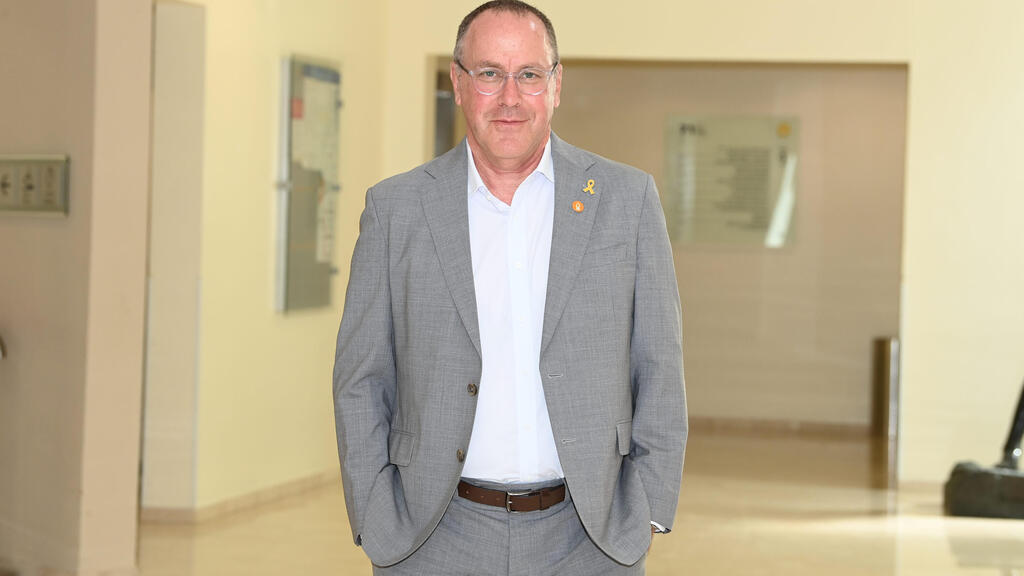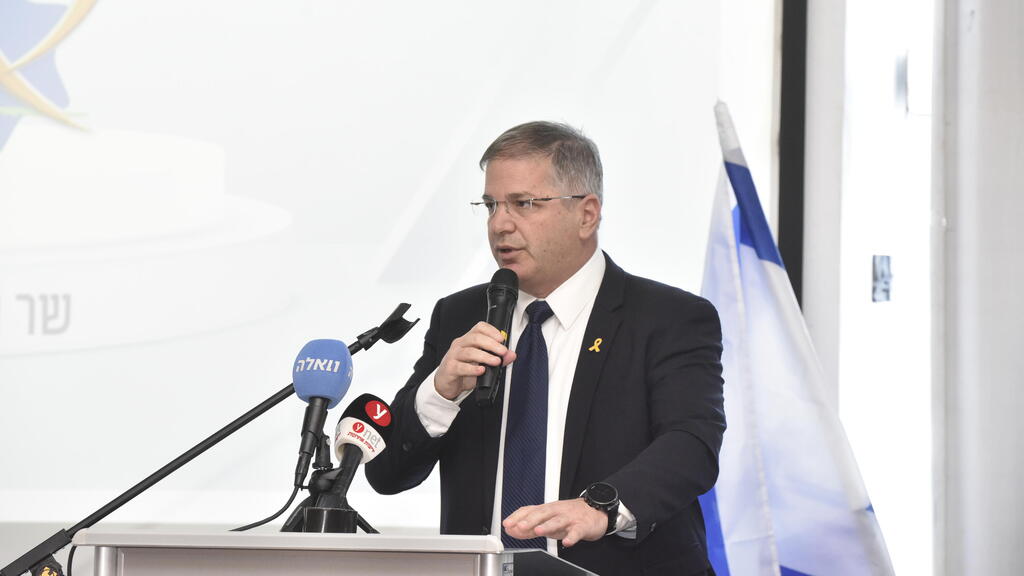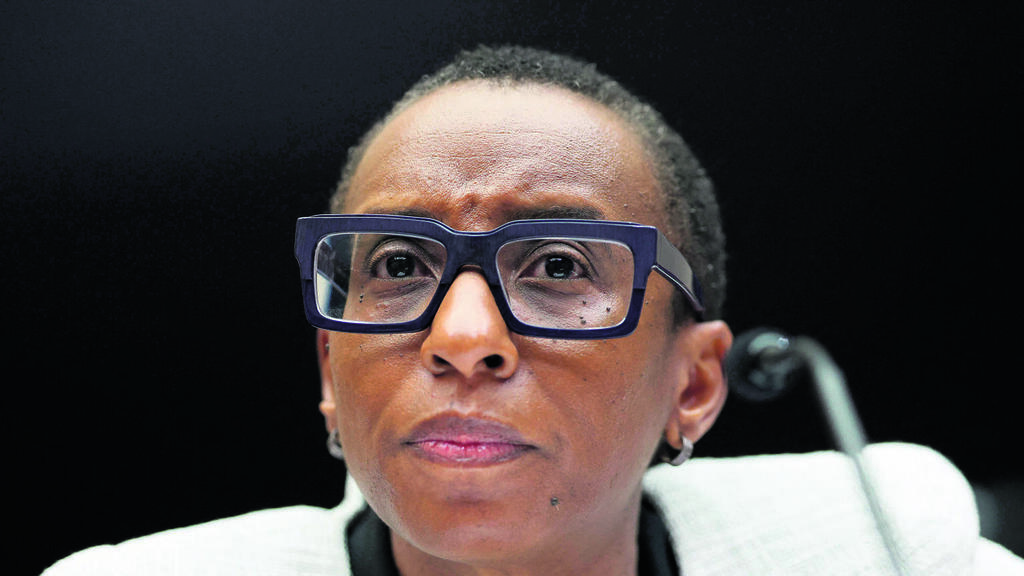Getting your Trinity Audio player ready...
Ben-Gurion University President, Prof. Daniel Chamovitz, will never forget his recent conversation with student Noa Argamani, who following 7 months as a Hama hostage in Gaza, was rescued by the IDF and returned to her studies in the summer semester.
"When I met with her before her mother passed away, what worried her most was whether she could complete her Information Systems Engineering degree with her class, with her friends. I told her, 'Noa, give yourself space and credit. Completing a full year in one month is almost impossible. But I promise you one thing: when the time comes to receive the degree, even if you haven't completed everything, we'll let you walk with your friends. You won't have the diploma yet, but many people don't finish their degree in four years for various reasons.'"
But he never imagined this is what he'd face as president.
Chamovitz: "True. Our faculty member Nili Margalit, who was kidnapped from Nir Oz and returned in the deal after 55 days in captivity, returned to teach in the Nursing Department. From Ben-Gurion, we had ten hostages, only Noa and Nili returned. As far as we know, three others are considered alive - Sasha Trupanov, Avinatan Or, and Sagiv Kalfon - and the rest were murdered.
After October 7, we had a management meeting to determine who we count as university casualties. It was decided that we count students, employees, first-degree relatives of employees, and alumni."
How many are there?
Chamovitz: "We've reached 115 so far. Just on October 7, there were 75 casualties. Dina Kapshitzer z"l, who was murdered in her car with her husband and children, worked in our Human Resources. It was the most terrible shiva (mourning period) I've visited. In summer 2019, when I took a course at Harvard for new presidents, there wasn't a chapter on how to manage a university after a massacre."
Broken but strong
This academic year, like its predecessor, looks different, skewed: out of 350,000 students in higher education, 70,000 students were called up for reserve duty. From Ben-Gurion University alone in the Negev capital, 6,495 students and 369 faculty members were mobilized. More than half of them served over 100 days in the past academic year.
"We'll do everything to enable students in reserves to succeed, but we don't want the doctor who says: 'You have this disease, I think it starts with a 'C', but I didn't learn that lesson' or an engineer who says: 'I just built a bridge, but I didn't study loads.'"
Last year, you were criticized for your approach.
Chamovitz: "True. Each institution had a different policy, so in the same unit in Jabaliya, for example, one student got X accommodations and another got a Y because one studies at Ben-Gurion and the other at Bar-Ilan. Last year we learned while running. When the war started, the Chief Reserve Officer told us: 'We think the war will end by January,' 'by March most reservists will be released.' It sounds funny now. Since then we've learned, we're improving, and we've done something seemingly impossible - all higher education institutions agreed on a unified policy. Do you know what it means to get 50 presidents to agree on a unified approach? This was negotiated with the Chief Reserve Officer and student unions. We created a policy that addresses 90 percent of the issues. Obviously, it won't be enough for everyone, but it will reduce some pressure, and that's an achievement."
So what has changed?
Chamovitz: "This year we have levels based on the number of reserve duty days, and we've included spouses in the accommodations policy. We understood that a spouse of a reservist, if they have children, can't attend classes when their partner is in reserves. We've also included security system workers and career military personnel who weren't part of the policy because they're in study-while-serving programs."
Collision course
Since the government's formation, says Prof. Chamovitz, relations between Education Minister Yoav Kisch and the Committee of University Heads have been on a collision course. "No need to sugar-coat it. But there's been a learning process on both the minister's side and the Ministry of Education about the place of higher education and political involvement in it."
Wasn't this obvious?
Chamovitz: "It's not obvious to many people in the country."
Please explain.
Chamovitz: "It seems that managing higher education is a profession that everyone in the country thinks they can do. No one would think to tell the Transportation Ministry how to conduct driving tests, or tell a hospital director: 'Why do you insist on having an emergency room?' But when it comes to higher education, it's different. Not just with Minister Kisch but with Israeli governments throughout the generations. Do people know what it takes to train a doctor or an engineer? Academic freedom isn't some 'leftist concept.' It means you have the right to research what you want, provided you can get the resources to do that research, and it meets the established standards of higher education. And that you can teach how you want, as long as it's within the approved curriculum.
"Academic freedom is what allowed the Western world to reach where it is today. Think about Israel: a quarter century before the state was established, the Hebrew University and the Technion were founded. This year marks 100 years for the Technion, and next year will mark 100 years for the Hebrew University in Jerusalem. Imagine the state without these institutions. When they were established, there was no state to supervise them, and they built modern Zionism as we know it - all the engineers who built the state, all the lawyers, all the politicians, all the teachers are graduates of these two institutions, the Haganah, the defense industries. What is Start-Up Nation? When we talk about Mobileye, where did it come from? From basic research at the Hebrew University. Or Copaxone, which is the Parkinson's drug that brought hundreds of millions to Israel in royalties - it started with basic research at the Weizmann Institute."
You're basically saying the Ministry of Education thinks its role is to control academia.
Chamovitz: "Not the Ministry of Education as much as politicians. There were calls to legislate all kinds of things affecting universities that we managed to stop."
Like what?
Chamovitz: "The Silencing Law, for example. There's a law against incitement to terrorism. You can't be a terrorism supporter in Israel. If you are, they arrest you. So they promoted a law against incitement to terrorism in higher education. Meaning, if someone here breaks the law they need to arrest them, but only professors, not employees within the university, only a very specific population."
Logic says that someone who supports the October 7 massacre shouldn't be able to teach in Israeli academia.
Chamovitz: "That's against the law, we don't need a separate law for that. There's the criminal threshold for all Israeli citizens, and then there's a proposed law just for professors in universities. Everyone thinks they know how to run a university, like how many credit points to give for a degree. People want to influence universities through legislation as if we're the enemy of the people. This was true in the previous government, the one before that, and it's getting more extreme.
"The State of Israel, with great wisdom, created a buffer between the government and higher education - the Planning and Budgeting Committee in the Council for Higher Education. This is supposed to block political influences on higher education. I spoke with a certain politician who couldn't believe that when I appoint a professor to a position, I don't know and don't care about their political views. I only care about excellence and commitment to higher education. People are convinced that if the university offers someone a position, it's because they vote left. At a meeting this week, someone threw at me: 'You leftists!'"
Well, are you leftists?
Chamovitz: "Such a leftist stronghold!" he chuckles. "It's funny because here at Ben-Gurion, in a university management meeting, I think you'd find voters from eight different parties around the table. But politicians are convinced everything is political. There are people who have an interest in creating this narrative, but it's a minority that wants political control over the university. There are countries like Turkey, Hungary, Russia, and Iran where the ruler appoints university presidents."
Do you think we're heading there?
Chamovitz: "No. But there are people who would like it to be that way."
What is the role of higher education institutions in social and political protests?
Chamovitz: "Excellent question. Historically, most protests were supported by or emerged from university students. In the American War of Independence, it was Harvard and Columbia College graduates. In France in the '60s with 'Red Danny' (Daniel Cohn-Bendit, who led the student rebellion in May 1968), it was students who took to the streets. In Israel in the '70s with the protest against Golda, 'Peace Now' - these were protests that came from universities, these were the students. As presidents, we want to push our students to be active citizens, thinkers, activists. It's their duty. When there were protests against the constitutional reform, we told students 'go demonstrate.' We allowed students from both sides to go to demonstrations, those for and those against. Everyone got exemptions. And simultaneously at Ben-Gurion, we held dialogue circles for students from both sides of the divide, to understand what we can agree on and what we can't. And why were universities so active? Because we had no doubt that this process could lead to erosion in the independence of higher education. We see this in all countries where this process happened - first the courts, then the media, and then higher education."
A reader might ask themselves: What's the significance of government control over higher education institutions?
Chamovitz: "Innovation, genius, and ideas flourish where there is free thinking. There's a reason why universities in the U.S. and Western Europe are productive, and universities in Iran or Russia or Hungary or Turkey are not. With all the investments in China, they don't have Nobel Prizes. Why? Because people there are afraid to fail, afraid of being fired."
If a right-wing government fully controls higher education institutions, could they decide, for example, to exclude Arabs?
Chamovitz: "That's not one of my concerns. It's in the interest of the entire country, right and left. Take the Bedouin population for example. If we don't bring them into Israeli higher education, they'll go study in Hebron and Nablus. How does it serve the State of Israel to have Israeli citizens studying at an Islamic college in Hebron because they weren't accepted to colleges within Israel, and returning with the ideas they received there? It's everyone's aspiration for people to advance. There's no greater engine for social change than higher education. If we look at Arab society, the percentage of students in universities is almost equal to their percentage in the general population."
To what extent can a student who identifies as Palestinian express their opinion on campus today?
Chamovitz: "We're seeing across all campuses that this was perhaps the quietest year in terms of friction between right and left or between Arabs and Jews, and that's because of our commitment to our shared space. Everyone understands that we're sitting on a powder keg and there are elements that want it to explode, and people also understand that not everything that's acceptable in peacetime will be acceptable during wartime. An Arab professor I work with told me something very interesting after October 7: 'I never understood Jewish paranoia. You're the strong ones. You have the police, you have the army, you have the wealth. Why are you so afraid of us? After October 7, I understand Jewish paranoia.' And this understanding makes the dialogue between us more equal. Because the discourse of 'you're the strong ones, we're the weak ones' doesn't serve anyone except politicians. The first two victims who arrived at Soroka on the morning of October 7 were Bedouin girls who died from a rocket hit on their encampment. Our Bedouin employee, Ahmad Abu-Latif, was killed in reserve duty in Gaza. And at the same time, we estimate that quite a few Bedouins here in the Negev have family in Gaza. It's very, very complex, but that's also our strength as Israelis."
Can students raise Palestinian flags on campus?
Chamovitz: "In the State of Israel, it's still legal to raise a Palestinian flag. However, we won't allow such demonstrations inside the campus while I have thousands of reservists fighting. It's possible that the Palestinian guy raising the flag is saying, 'I'm just identifying with my national identity, I'm not suggesting that Israel shouldn't exist.' That's true, but everyone who sees it thinks that he does mean that. The president of Arizona University said something very correct, that there is freedom of expression but there's another freedom, and that's freedom from fear. And if your freedom of expression causes me to fear - we must find an agreement. Most Jews who see Palestinian demonstrations today are afraid, and rightfully so. I must maintain a space where people can come, learn, succeed. It's not one-sided. Years ago, a group of Bedouin community leaders came to me requesting that we ban Palestinian demonstrations, for example on Nakba Day. They said these demonstrations create a negative atmosphere that prevents people from sending their children to study at the university, and that made me switch my thinking that things aren't one-dimensional, that there's a lot of gray here. The campus must be a place where we challenge students, challenge each other. That's the whole essence of learning. It doesn't have to be pleasant, doesn't have to be comfortable, but you need to be physically safe. Sometimes that means there won't be a demonstration. It doesn't mean you don't have freedom of expression."
DNA of cauliflower and lettuce
At 61, married plus three, he lives on the Hod HaSharon-Beer Sheva line. Originally from a small town in Pennsylvania, which he compares in our conversation to Yeruham. A person who speaks with the same passion about politics and plant genetics, his scientific base. On his office walls are two photographs, close-ups of lettuce and cauliflower DNA. In 2012, he published the book "What a Plant Knows," which ranked that year among Amazon's ten best-selling science books. He also served as Dean of the Faculty of Life Sciences at Tel Aviv University and founded the Manna Center - the Food Security Program.
As a former student at Columbia University, who in the past year has become representative of the "woke" generation calling to free Palestine from the river to the sea while holding low-fat Starbucks coffee, he explains the paradox well: "I knew this would happen. I know what it's like to be American. I was at Columbia University in the early 80s, during the First Lebanon War.
Even then there were demonstrations against Israel showing Sharon with fangs and Palestinian children's blood dripping from them. There were very large social movements against apartheid in South Africa then, and there was a huge demonstration calling for Columbia University to divest its money from there. Students raised flags with slogans like 'Blacks Against Apartheid,' 'Chemistry Students Against Apartheid,' 'Lesbians Against Apartheid,' and the flag we raised - 'Zionists Against Apartheid' - they took down from us because 'you can't be part of this.' It's an inability to contain complexity, along with guilt that I'm rich and privileged.
I don't blame these kids. They're 18-21, their lives are very protected. And we need to be honest enough to say that what they see on TV is not what we see on TV. We don't see the suffering of Gaza residents. People can say they deserve it, that they don't deserve it, but that's a fact. We look very bad on TV in the United States, and Americans have a very short memory. Who there remembers October 7? And there's a lack of academic leadership willing to set boundaries and say: 'True, there's complexity, but rape is always wrong,' for example."
Would you have believed Harvard would go to this place?
Chamovitz: "Yes. What did Harvard, Penn, and Columbia have in common? They all had presidents, coincidentally all new female presidents, with no experience. Nothing prepared them for this. When I became president, I thought I'd have lots of parties and meetings with rich people around the world, and instead, I got COVID, protests, and war. And alongside academic leadership, there are academic currents that fueled the protests, especially in social sciences. 'Intersectionality' (a theoretical framework that examines the intersection between forms or systems of oppression, control, and discrimination), which is the dominant current in social sciences, perhaps also in humanities, says for example that the Palestinian struggle is the same struggle as LGBTQ+. That's how you also get to 'Queers for Gaza.' In November, I was interviewed by one of the newspapers in the U.S., and I said that I want Jews and Israelis to receive the same treatment as gender identity receives on U.S. campuses. There, if a professor addresses a student with the wrong gender pronoun, they can be brought before a disciplinary committee. Of course, I got into trouble and was attacked for being anti-gender."
How will this affect the American academic world?
Chamovitz: "I feel this will end up in the dustbin of academia. These things won't have a long-term impact."
Get the Ynetnews app on your smartphone:






